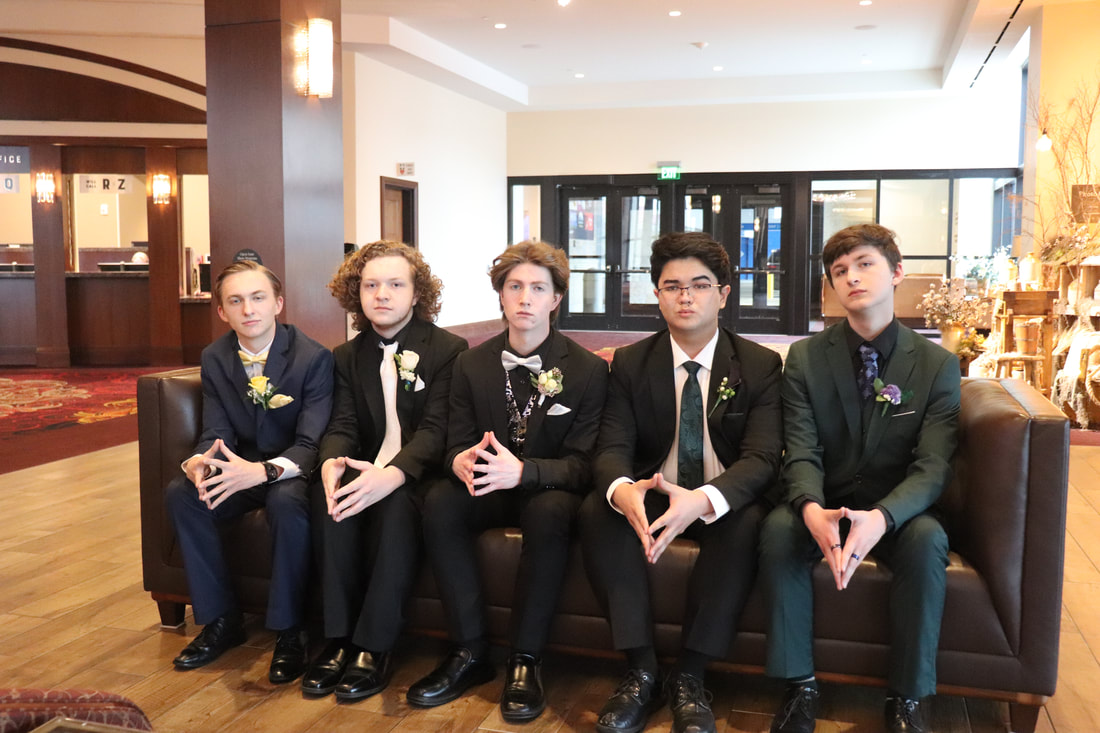About the editor:
|
|
Hey, didn't see you there.
The name's Riley. Oh? you didn't ask for my name? Well, you probably also didn't ask to know that I am a student here at CCHS who sings in our Chamber and Bell Choirs! Being an editor for the opinion grab-bag page is a challenging job but I hope to inspire some joy and laughs while reading the news! |
Senior Wisdom
The fire is dying, the lamp is growing dim, Corner Canyon is only a few weeks away from losing the wisdom of their senior class.
I wish to leave my 4 years of experience on this page for however long it lasts. I've walked these hallways for years and have seen and experienced many stories and narratives. (I also have a lot of quick stories for the Chronicle that I can’t make into a full story) So here I leave you with this, my life’s wisdom and unsolicited advice for the High School Experience:
I wish to leave my 4 years of experience on this page for however long it lasts. I've walked these hallways for years and have seen and experienced many stories and narratives. (I also have a lot of quick stories for the Chronicle that I can’t make into a full story) So here I leave you with this, my life’s wisdom and unsolicited advice for the High School Experience:
- Don't Snuggle up with one another in the hallways, hand holding is okay, but once you start interrupting my way to class with your 12:37pm cuddle-sesh by blocking the hall, I'm going to bodycheck you.
- No one cares about what you look like / dress like in school. As long as you don't smell like a moldy rug I seriously doubt anyone is going to remember you by your outfit or pheromone trail (unless you put a lot of work into it, the fashion kids will remember you for that)
- If the majority/all of your jokes are racey and “DaRk HuMoR” you aren’t funny, you are just schrodinger's douchebag who changes whether or not you are spewing political beef or a joke based on the reactions of those around you.
- Similar to #3, if your personality is based on only one or two traits, you are shallow and likely annoying to be around, get a hobby, get a job, don't be a unicycle of unstable self expression.
- I really don't think the school lunch is that bad, spicy chicken sandwich + hamburger on the off days is best for the average joe, if you get a regular chicken sandwich, god might not judge you, but I will.
- Whenever your teacher gets political, just smile and wave, don't explicitly agree or disagree, you look like a loser / brown-noser.
- The “super senior” that dates freshmen is not a myth, it’s very much real. Please god do not date 2 grades above you, no you aren't “mature for your age”, you are a victim of your age.
- For the AP’s, AP math and sciences are hard, AP english classes are endurance-based, and AP social studies classes are only hard if you actually read the textbook, skim and get that 5.
- Please join a club, elective, or some sport. It will 100% help you get friends and the beginnings of a social life, best thing you could ever do in high school.
- Lastly, have fun, there is 100% a line between academic achievement and academic burnout and you DON'T want to do the latter, trust me, it’s not good. Take time to step back and have time for yourself, some assignments don't have to be done, and you are more than a 4.0 student.
Senior-Wisdom from fellow fabulous friends
Kaleb Judd: “If there's one thing that can outcast you from school society, PDA is that thing. The only thing this school can agree on is that PDA is the devils dance and only those who have succumb to his lies commit such an act. Spend your time learning, not procreating.”
Jacob Lybbert: “Beware the upperclassmen that’s too nice to you, it’s weird.”
Henry Atkin (Speech and Debate Captain) “EVERYONE SHOULD IMMEDIATELY JOIN THE SPEECH AND DEBATE TEAM. ITS FUN. also if you can make it happen dont have a first period being able to sleep is a super power”
Jasmine Washington: “If you even think theres no way you'll want honor cords, you're lying to yourself. Do your future self a favor by doing the bare minimum of showing up and doing the work!”
Alyssa Miller: “One bad day is only one bad day. One assignment is only one assignment. In a world of a lot of different things just remember that the thing stressing you out right now is only one thing”
Chloe Scott: “Enjoy every second. As annoying and difficult as it is sometimes, it goes by fast. You will make some of the best memories and meet some of the best people during your senior year, so enjoy it while it lasts and treasure every moment.”
Ara Messarian: “Don't let anybody tell you who you are or what you have to do. As the beloved Mrs. Frizzle once said, ‘Take chances, make mistakes, get messy!’”
Hunter Hickock: “It’s never too late to start something, but not starting earlier will always be a regret, so join that thing already!
Kaleb Judd: “If there's one thing that can outcast you from school society, PDA is that thing. The only thing this school can agree on is that PDA is the devils dance and only those who have succumb to his lies commit such an act. Spend your time learning, not procreating.”
Jacob Lybbert: “Beware the upperclassmen that’s too nice to you, it’s weird.”
Henry Atkin (Speech and Debate Captain) “EVERYONE SHOULD IMMEDIATELY JOIN THE SPEECH AND DEBATE TEAM. ITS FUN. also if you can make it happen dont have a first period being able to sleep is a super power”
Jasmine Washington: “If you even think theres no way you'll want honor cords, you're lying to yourself. Do your future self a favor by doing the bare minimum of showing up and doing the work!”
Alyssa Miller: “One bad day is only one bad day. One assignment is only one assignment. In a world of a lot of different things just remember that the thing stressing you out right now is only one thing”
Chloe Scott: “Enjoy every second. As annoying and difficult as it is sometimes, it goes by fast. You will make some of the best memories and meet some of the best people during your senior year, so enjoy it while it lasts and treasure every moment.”
Ara Messarian: “Don't let anybody tell you who you are or what you have to do. As the beloved Mrs. Frizzle once said, ‘Take chances, make mistakes, get messy!’”
Hunter Hickock: “It’s never too late to start something, but not starting earlier will always be a regret, so join that thing already!
Why I love Utah
|
BY LILY HERSCH
HEAD OF STAFF Last year around this time I made a sarcastic article about why I “love” Utah; it essentially consisted of snarky remarks about the roads, people, etc. Was it true? Yes. Was it mean? Yes. I wrote it as a sophomore fresh to Utah with pretty much no friends. I was Gabriella Montez in High School Musical? Now, I am Sharpay and have an appreciation for the Smog State I didn’t before. First, Utah is beautiful. It has a diverse range of scenery, from snow capped mountains, meadows, red canyons, and more. In fact, Utah.gov states that Utah's peaks, on average, are the tallest in the country. Last November when I did my half marathon in Moab, it was hard to focus on the trail while such an incredible landscape surrounded me. Also for the fact that my ex boyfriend’s mom happened to be running behind me, but that’s besides the point. “One thing I like about Utah is the stunning landscapes and nature. It's a place where you can truly appreciate the beauty of the outdoors and feel welcomed by the community.” Comments Kurt, CCHS junior. |
Second, people are really nice here. This was a culture shock when I moved from Colorado; people in a small mountain town are nice, but half of that is because they’re high on marijuana. Here, not so much. Dirty Dr. Pepper doesn’t have that kind of power. People here in general are just jolly.
Third, there are so many opportunities in Salt Lake City; especially at Corner Canyon. Yes, the stereotype of it being a rich kid school full of dented BMW’s and white Jeeps is true. That said, because of how affluent it is, students have access to great teachers, classes, athletics, blah blah blah. I still don’t go to football games, but I bet they’re some of the best in terms of highschool football. Per 9News, Utah was voted the overall best state for 2024 because of its elite healthcare and education. The United States has 50 unique, interesting, and partly mediocre states; for Utah to be at the top of those even if based on specific components is quite remarkable. “The grass is greener on the other side” I’ve heard repeated to me throughout all of my life; meaning, you always think there is some place better to be. I’m like a crocodile: I like to bask in the sun, I’m long, and probably would thrive best in Florida. That said, satisfaction with where you are in life, physically and mentally, is not based on the exterior; it’s based on your interior. Go to swig and sit in the Utah summer sun! |
Existentialism
By Lily Hersch
Head of Staff
Head of Staff
|
A few weeks ago I was running. It was the early morning: dark out, cool. My steps were just barely discernible in the muddy, sandy soil. I wasn’t listening to music; just the air blowing past my ears, my heavy breathing when I ran up a hill. And then I just stopped. In the middle of the road, quiet and undisturbed as most of my world was still asleep. And then I turned. I looked around: the furnished lawns, the porch flags silently waving in the night breeze, the cars waiting to be used. And I thought “What the ****?”
I've really been thinking about how strange life is. I don't think I'm some Freud or Nietzsche for thinking these thoughts; practically everyone has, I would believe. But I don’t think we think about it enough. Somehow, some way, we all are just here. On Earth. And we've created a world for ourselves. Just like that. And we let this fact whizz through and out of our mind in a bemused response of, “Huh. How funny!” and we continue on. “The world is, of course, nothing but our conception of it.” - Anton Chekhov. With every breath, step, turn, and actions of the world’s history, we are here. As said before, a flap of a butterfly’s wing and you and I may have never even existed. I guess this whole dialogue I am talking of would be considered Existentialism..
When I asked student Lotus Bolan what she thought about existentialism, she said “It’s true but VERY FEW people choose to follow that.” |
When I asked student Lotus Bolan what she thought about existentialism, she said “It’s true but VERY FEW people choose to follow that.”
Since that run, more and more I seem to pause what I’m doing against my own volition and can’t help but think about this. Look around! Here we have made meaning out of everything. Our clothes, our hair, our loved ones, our passions, our lives. Everything has a purpose we have fabricated, and in another existence it could be entirely different. This has made many say, well, then nothing matters! I think saying nothing matters is a cheap way of excusing yourself from the combat of life. Living without regard is living with no purpose, and that also being fulfillment. Everything matters. It matters because we make it matter. I think to be content, it is a necessity for everyone to make their world have a meaning, in one way or another. When I asked student Vivenne Huh how she gives her life meaning, she said “I make my world have meaning by looking for at least one positive thing I can do for another person every day.” I don't feel I really have any purpose in writing this; it’s something my brother would make fun of me for. Maybe the meaning of our world is too murky of a subject for a school newspaper. Really, I just want people to ask themselves more, “what gives my world meaning?” and to use that as their own propeller for life. |
"Graduation SPEECHES"
|
|
BY RILEY HAMADA
EDITORIAL EDITOR 7 weeks, that’s how long seniors at Corner Canyon have left until they graduate, (for reference, that is about 4233600 seconds!) We will all excitedly sit down in our chairs, a rehearsed and uniform action practiced a thousand times, our diploma’s a couple of feet away. 12 years of work, the long nights spent working on projects, the mountains of homework, the “group projects” where you end up doing most of the work, school is exhausting and you are finally able to leave it all behind in only a few short moments. Then the speeches start I think I speak for many when I say that graduation speeches are kinda lame most of the time. Every speech ever just sounds like repetitions of “Make sure you always try your best and shoot for the stars!” Speeches are exhausting to deal with, you are forced to sit still while some random kid or PTSA member you’ve likely never talked to before attempts to give you life advice that they think actually applies to you. |
It’s even WORSE when the faculty and school board start giving their separate schpeels, I guarantee you no one in the audience wants to hear Board Member #4 start opening their mouth to talk about how proud they are of “their kiddos”.
No one is really invested in graduation speeches. The parents only want to see their kids walk on stage, the students only want to get their diploma (and maybe icecream after), even the teachers in the audience are ready to no longer listen as one of their bosses take credit for “leading the future generation” when in reality it was themselves. “I’ve been to graduation 4 times already, I don't need to go there again” is a sentiment shared by senior Alyssa Miller and likely many more students here at CCHS. I think that graduation speeches should only have the principal, maybe a passionate English teacher or two, and then just students, with students able to act more freely and not feel pressured to have a cheesy message. Thankfully, yours truly has been given the chance to implement his design for the graduation of the 2024 class, I hope you all come to listen to what is politely described as a “disaster” by fellow editor Asher Candell. Here’s to making graduation fun again! -RH |
"Prom Perfection"
|
Preposterous Personal Prom Pre-Planning Probing Preview: CCHS students' planning for dances often takes a lot of different angles, here are just a few from those I interviewed! “Planning for a dance is super fun because you can do things that you already were planning on doing but you have an excuse for it!” - Hanah Chanthapuang “I didn't go to prom” - Anonymous (i'm not going to snitch on my boy like that!) “we didn't rly plan it lol plans r cringe dances have too many people. 2.3/10” - Anonymous “I thought it was so fun. I didn't do much planning, but I know the boys made reservations for the day date and dinner ahead of time." - Ava Lindman "I usually just like to sit back and let it happen, because it's always fun no matter what!!” - Chloe Scott “Whipped out the eBird to see where snow geese were last spotted, grabbed the field guides and binoculars and hopped in the minivan” - Hunter Hickock (he was just talking about birds? idk) "It was very hectic since we did not plan anything really besides the day before so it was very spontaneous." - Kaleb Judd |
BY RILEY HAMADA EDITORIAL EDITOR Many CCHS students are getting ready for the 2024 prom dance, starching their suits, ordering boutonnieres and corsages at whatever price they can get, glittering up their dresses with the finest of *sparkle*, etc. It is time to dance! Go ahead! Spend your time stressing about who to ask, or worrying about whether or not YOU will be asked out to this dance. Maybe you will rally the courage and ask that one cute girl in your math class who keeps tutoring you despite your consistently failing results. Watch as you spend hours on the poster, making sure every character is written out with delicacy, care, and a perfect 3” font size. You go to three different stores looking for just the *perfect* treat to go along with the poster, it must. Be. PERFECT. D-day, crowds begin to gather around your future prom date, you push and wriggle your way into the front of the waves of potential suitors for Sally McGee. Soldiers on D-day had less things to worry about than you at this moment. You are ecstatic to see that in a couple of days, you too receive a poster by Ms. Mcgee, a sign that must be of the greatest importance ever. You quickly gather a group, NO! A team! To plot and scheme and try to seem as if the prom plan was a slick and quick-made schedule. |
You push each member to their limits with you as you constantly argue and bicker for your perfect date, compromise is for the weak when prom is at stake!
THE DAY. SATURDAY. MARCH TWENTY SECOND, 2024. You wake up in a cold sweat, you couldn’t get any sleep, only getting visions of the day ahead, possible pitfalls, and anxious nightmares of what could go wrong on this perfect day. The day's event goes well, everyone tries to talk to you and Sally, but you’ve already told them to follow the perfect script you’ve written three weeks ago, (it’s rather annoying that they DIDN'T follow it.) But okay, this date will go right, NEEDS to go right, otherwise your entire high school career will go up in smoke and flames! The dance begins in earnest, you all drive up to the school, you already feel the sweat and smell of 300+ high school boys moshing in the gym. Entering, your friends all leave you to go with, in their words, “less controlling company”. Who needs THEM on your perfect date?! The dance goes well (for you at least) and you drive back home to your date’s house, she calmly walks out of the car and compliments you by quietly calling you a “perfectionist prick” clearly for your sharp outfit and ability to plan. A perfect date. |
"Lifetime Fitness Sucks"
|
|
BY ANNA YERGENSEN I’m just gonna say it, Lifetime Fitness is terrible. It isn’t fun and it actually makes you do work. You’re in the fitness room and trying to get your heart rate above a certain level in order to be graded. Scott Larsen, a senior here at CCHS, agrees. “It’s pointless and stupid. At times it can be fun but most of the time it’s pointless.” which leaves the argument, why do it? No one enjoys it and unless you’re an athlete or exercise enthusiast, it’s gonna suck, AND you have to take it to graduate, so it’s a lose-lose situation. Some people have done it online, like Lily Hersch. “I mean I wouldn’t say that I learned anything that I didn’t know. It’s probably good for freshmen or people who just don’t know the basics of the body. But for people who exercise regularly and athletes, it’s kind of pointless.” |
That’s what I’m thinking of taking, it sounds way easier and nicer than in person. Aleks Marr also took in online, not wanting to do it in person like the rest of us. “It was very informative and as long as you stayed on top of your work, it’s a pretty simple class.” Later they said, I will never recover, I will never forget, I will never forgive.
Here’s the thing with regards to the people that are athletes or exercise regularly, Why should they take a fitness class when their sport already fills the quota? I’m a dancer, and so I’m gonna have to take that class and then have to dance. No thank you, I’d rather just dance and take a different class. Additionally, many athletes fail the class for not being able to get their heart rate with what they are doing. Most of them I know have barely made it through with a passing grade, not having it be their fault. Yes, having an active class CAN be good for students, but how much is it really? Lifetime fitness is just a pain and it’s another thing that we just have to bear through to graduate. |










